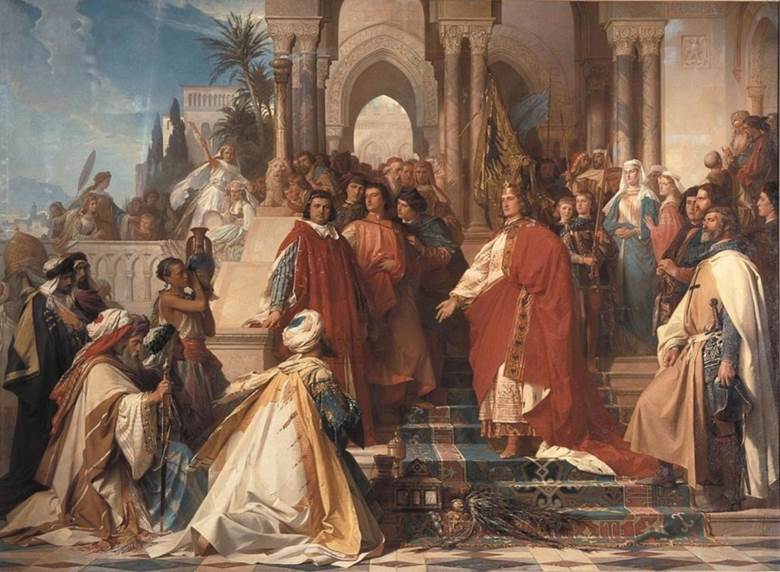

The emperor showed respect for religious minorities like Jews and Muslims, promoted the work of the great Andalusian Muslim philosopher Ibn Rushd, or Averroes, and was known to celebrate festivals associated with the holy Prophet of Islam. He was fascinated by and committed to the pursuit of knowledge and greatly respected Islamic learning, often writing to the greatest rulers in the Muslim world to seek their responses to important philosophical questions
The Power of International Dialogue & Friendship: A Lesson from History
By Dr Akbar Ahmed
American University
Washington, DC

Frederick II, the Holy Roman Emperor who lived from 1194 to 1250, was one of the most powerful rulers of Europe in his time. Raised in Sicily, which had a significant Muslim population, he spoke numerous languages, including Arabic, had a Muslim bodyguard and his coronation mantle, which bore Arabic inscriptions, became the coronation mantle for every Holy Roman Emperor until the 18th century.
The emperor showed respect for religious minorities like Jews and Muslims, promoted the work of the great Andalusian Muslim philosopher Ibn Rushd, or Averroes, and was known to celebrate festivals associated with the holy Prophet of Islam. He was fascinated by and committed to the pursuit of knowledge and greatly respected Islamic learning, often writing to the greatest rulers in the Muslim world to seek their responses to important philosophical questions.
Frederick II had every reason to think like other Europeans of his time about Islam and Muslims. Yet by taking a drastically different route — establishing rapport with the other side through learning and scholarship, laying out his objectives, and listening to theirs with respect — he was able to forge an unprecedented alliance and accomplish the impossible
Frederick's greatest triumph - which should be taught in schools of foreign affairs and diplomacy today - was to use these tactics of cultural understanding and respect to successfully take Jerusalem for Christianity. In doing so, Frederick accomplished the dream of every Christian ruler of Europe since the legendary Sultan Saladin had recaptured the city from the Christians decades earlier in 1187, ending nearly 90 years of Christian rule.
As word reached Sultan Malik al-Kamil of Egypt, the nephew of Saladin, that a new Crusade was heading his way, he heard rumors about the emperor who was leading it. Al-Kamil sent his vizier, the Egyptian Emir Fakhr ad-Din, to visit Frederick and assess the situation. A close friendship developed between Fakhr ad-Din and Frederick that was enriched by the exchange of ideas and gifts. Frederick even knighted Fakhr ad-Din.
Through the exchanges with Fakhr ad-Din, Frederick and al-Kamil negotiated a deal, known as the Treaty of Jaffa (1229), whereby Frederick would obtain Jerusalem but the Muslims would control Al-Aqsa and the Dome of the Rock on the site of Solomon's Temple, which Christians could access to pray. Jews would be permitted entrance to the city to pray at the Western Wall on the Temple Mount, Muslims would retain a qadi, or judge, in Jerusalem and non-resident Muslim pilgrims in Jerusalem were to be protected. Muslims were also to be allowed access to Bethlehem, which passed to Frederick's control. Nazareth, Sidon, Tibnin (Turon), Jaffa and Acre were also handed over to Frederick.
Escorted by his Muslim bodyguard and accompanied by his tutor in Arab scholarly thinking, a Sicilian Muslim, Frederick arrived in Jerusalem soon after to be received with honor by Shams ad-Din, the eminent qadi of Nablus, who the sultan assigned to host Frederick. In his enthusiasm to honor his guest and not to disturb his rest, Shams ad-Din asked the local muezzins not to make the call to prayer. But the next day Frederick was not pleased and complained to the qadi, "O qadi, why did the muezzins not give the call to prayer in the normal way last night?" Shams ad-Din replied, "This humble slave prevented them, out of regard and respect for Your Majesty." That, however, did not please Frederick: "My chief aim in passing the night in Jerusalem was to hear the call to prayer given by the muezzins, and their cries of praise to God during the night." Frederick then reprimanded the qadi: "You have done wrong; why do you deprive yourself because of me of your normal obligation, of your law, of your religion?"
Shams ad-Din later accompanied Frederick to the Al-Aqsa Mosque and the emperor expressed his delight at its beauty, especially the magnificence of the mihrab, or arch that points toward Makkah.
After Frederick returned from the Middle East he continued to speak effusively of the Egyptian sultan, telling distinguished visitors that his friend was dearer to him than any person alive save for his own son. When the sultan died in 1238, Frederick mourned. In a letter to the King of England, Frederick lamented the sultan's passing, writing that "many things would have been very different in the Holy Land if only my friend al-Kamil had been still alive."
While the 21st century is very different from the 13th, this episode from history is a lesson for Western governments and the Muslim World. Frederick had every reason to think like other Europeans of his time about Islam and Muslims. Yet by taking a drastically different route - establishing rapport with the other side through learning and scholarship, laying out his objectives, and listening to theirs with respect - he was able to forge an unprecedented alliance and accomplish the impossible. His example could not be more relevant than in today's age of "fake news" and rampant xenophobia.
(Akbar Ahmed is the Ibn Khaldun Chair of Islamic Studies, School of International Service, American University, Washington DC. He is a Wilson Center Global Fellow. He was the former Pakistan High Commissioner to the UK and Ireland and in 1970-71 was Assistant Commissioner in East Pakistan.)

